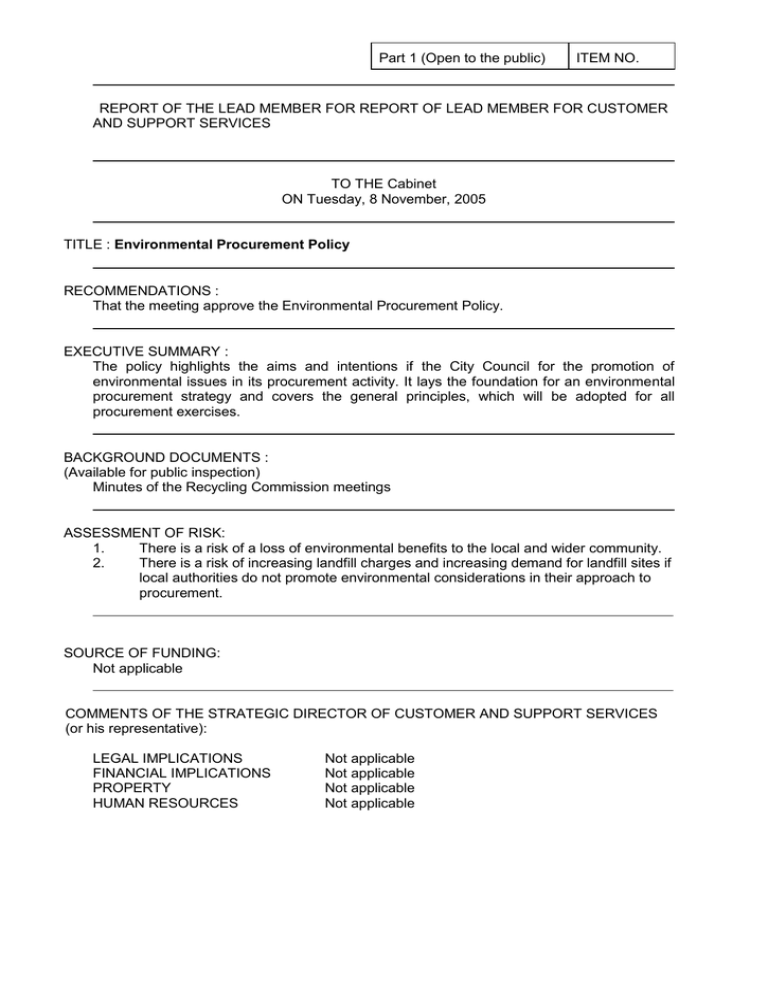Part 1 (Open to the public) ITEM NO.
advertisement

Part 1 (Open to the public) ITEM NO. REPORT OF THE LEAD MEMBER FOR REPORT OF LEAD MEMBER FOR CUSTOMER AND SUPPORT SERVICES TO THE Cabinet ON Tuesday, 8 November, 2005 TITLE : Environmental Procurement Policy RECOMMENDATIONS : That the meeting approve the Environmental Procurement Policy. EXECUTIVE SUMMARY : The policy highlights the aims and intentions if the City Council for the promotion of environmental issues in its procurement activity. It lays the foundation for an environmental procurement strategy and covers the general principles, which will be adopted for all procurement exercises. BACKGROUND DOCUMENTS : (Available for public inspection) Minutes of the Recycling Commission meetings ASSESSMENT OF RISK: 1. There is a risk of a loss of environmental benefits to the local and wider community. 2. There is a risk of increasing landfill charges and increasing demand for landfill sites if local authorities do not promote environmental considerations in their approach to procurement. SOURCE OF FUNDING: Not applicable COMMENTS OF THE STRATEGIC DIRECTOR OF CUSTOMER AND SUPPORT SERVICES (or his representative): LEGAL IMPLICATIONS FINANCIAL IMPLICATIONS PROPERTY HUMAN RESOURCES Not applicable Not applicable Not applicable Not applicable CONTACT OFFICERS : Gary Amos, Assistant Director (Procurement) (0161) 793 3878 Linda Sharples, Scrutiny Support Officer (0161 793 3324 WARD(S) TO WHICH REPORT RELATE(S): ALL WARDS KEY COUNCIL POLICIES: Best Value; Procurement Policies; DETAILS The Environmental Procurement Policy has been drafted as a result of the work of the Recycling Commission over the past year. It identifies actions, which are to be taken during the procurement process to ensure that the goods and services purchased by the Council reflect its environmental aims. The policy will be used to further develop the environmental aspects of the procurement strategy and will include the issues of whole life costs, disposal and opportunities for recycling. There is also considerable emphasis placed on working with the Council’s existing contractors and supply chains, which will place a substantial workload upon procurement staff so, consequently, it will be necessary to carry out this work in partnership with expert practitioners, such as WRAP, and to take advice from organisations which have achieved success with this approach, for example the Co-operative Group. This policy represents the first step in the process to develop a more effective environmental approach to procurement. Development work will continue throughout the year with the Recycling Commission, which will identify specific targets and areas for further development. Ultimately, the scope of this policy is capable of expansion throughout AGMA and, via the Regional Centre of Excellence, other authorities in the northwest region. SALFORD CITY COUNCIL ENVIRONMENTAL PROCUREMENT POLICY The Council is committed to sustainable development and aims to carry out its procurement activities in an environmentally sustainable manner. Therefore the Council will: 1. Work with suppliers to introduce environmentally friendly processes and products. 2. Promote the determination of suppliers’ environmental credentials through the appraisal process where appropriate. 3. To ensure, where appropriate, that environmentally preferable procurement is specified in the award of contracts. 4. Identify and consider ‘whole life’ costs when procurement decisions are made, including non-quantifiable environmental impacts, impact of disposal and opportunities for recycling. 5. When specifying or designing, seek opportunities to reduce the need to rely on virgin material and where appropriate reuse/recycle existing products. 6. Where items are of a similar cost, give preference to those manufactured with recycled content. 7. Carry out an environmental assessment of the Council’s major suppliers. 8. To comply with all National and European procurement legislation. 9. To produce an Environmental Products guide to support this procurement policy and guidance documentation. 10. This Environmental Procurement Policy supports the Council’s corporate procurement strategy and work will continue to develop an environmental procurement strategy
